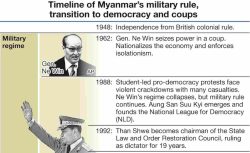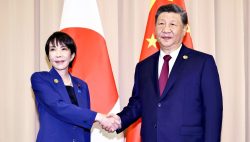Official Start of Lower House Election Campaign: Determine Which Political Parties Are Worthy of Trust
15:55 JST, October 16, 2024
Amidst a mountain of domestic and international challenges, an important election has begun that will determine Japan’s future direction. It is hoped that voters will calmly determine which political parties and candidates are reliable and cast their votes responsibly.
Campaigning for the 50th House of Representatives election has officially kicked off. The focal point is whether the ruling Liberal Democratic Party and its coalition partner Komeito can secure a majority of 233 seats in the lower house and Prime Minister Shigeru Ishiba can build a structure for the full-fledged management of his administration, or whether the opposition parties’ goal of the LDP and Komeito losing the majority will become a reality and the political situation will become more fluid.
The economy is on a recovery trend, but wage increases are not keeping pace with rising prices. Other points of contention are how to respond to the rapidly deteriorating security environment and how to meet the rising demand for energy.
It is hoped that the political parties and candidates will offer persuasive solutions for these issues and engage in constructive debate.
The issue of politics and money has put the LDP on the defensive.
The LDP leadership has continued to be shaken over how to handle lawmakers who failed to include funds they received in their political funds reports.
In a debate at the Japan National Press Club, Ishiba said the LDP would use political activity funds “in a restrained manner.” However, after he was harshly questioned by the opposition parties, he changed course the following day, saying that the LDP would not use the funds for elections.
How voters view this series of responses from Ishiba could affect the outcome of the lower house election.
The main opposition Constitutional Democratic Party of Japan has fielded 237 candidates, more than half the total seats in the lower house. However, they are competing with other opposition parties’ candidates in many constituencies, and some are concerned that the opposition candidates will cut into each other’s votes.
The total number of candidates this time is 1,344, or 293 more than the previous lower house election three years ago, which saw the fewest candidates ever under the current system. Of those running this year, 314 are women, 85 more than the previous record high in 2009.
One factor behind this situation is that many opposition parties, including the CDPJ and the Japanese Communist Party, campaigned together three years ago, but coordination among them has not gone smoothly this time. Instead, each opposition party fielded its own candidates.
Another element is that the LDP did not allow 34 former lawmakers and others who failed to include funds they received in their political funds reports to run in proportional representation segments and single-seat constituencies at the same time. Instead, the LDP fielded candidates at the last minute who are running only in proportional representation segments to make up for the decrease.
These candidates include a number of clerical and administrative party staffers and female business executives who decided to run after they were asked to do so by the LDP leadership, among others. They can be said to be diverse human resources, but are people who were apparently recruited just to make up the numbers prepared to fulfill their role as representatives of the people?
In recent years, there has been a spate of problems in various elections, including interference in election campaigns, the display of posters that have nothing to do with the election and bizarre actions on broadcasts of candidates’ views.
Such behavior that makes a mockery of elections, which are the foundation of democracy, is unacceptable. All candidates should strictly follow the rules and conduct sound election campaigns.
(From The Yomiuri Shimbun, Oct. 16, 2024)
Top Articles in Editorial & Columns
-

Myanmar Will Continue Under Military Rule Even After Election, Ex-Ambassador Maruyama Says in Exclusive Interview
-

40 Million Foreign Visitors to Japan: Urgent Measures Should Be Implemented to Tackle Overtourism
-

Expansion of New NISA: Devise Ways to Build up Household Assets
-

China Criticizes Sanae Takaichi, but China Itself Is to Blame for Worsening Relations with Japan
-

Withdrawal from International Organizations: U.S. Makes High-handed Move that Undermines Multilateral Cooperation
JN ACCESS RANKING
-

Univ. in Japan, Tokyo-Based Startup to Develop Satellite for Disaster Prevention Measures, Bears
-

JAL, ANA Cancel Flights During 3-day Holiday Weekend due to Blizzard
-

China Confirmed to Be Operating Drilling Vessel Near Japan-China Median Line
-

China Eyes Rare Earth Foothold in Malaysia to Maintain Dominance, Counter Japan, U.S.
-

Japan Institute to Use Domestic Commercial Optical Lattice Clock to Set Japan Standard Time



















